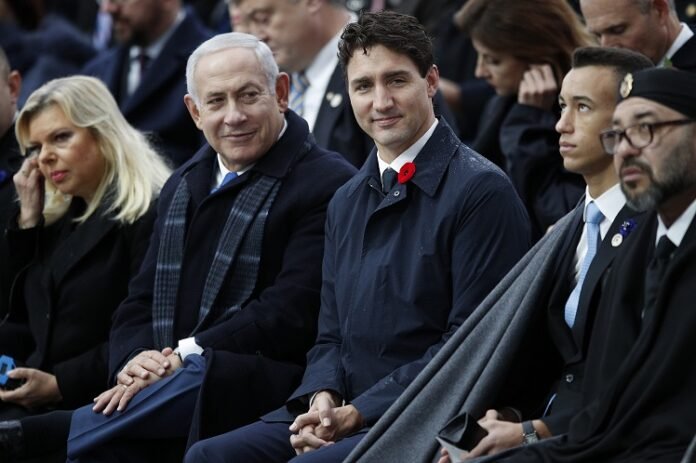Israeli Prime Minister Benjamin Netanyahu intends to visit Morocco at the invitation of King Mohammed VI later this year, Israel media outlets reported.
Netanyahu will carry out official visits to Turkiye and Cyprus in early September, he will then travel to the United States where he will attend the United Nations General Assembly meeting in New York.
During his visit to the US, Netanyahu is scheduled to meet with President Joe Biden.
The Israeli premier will also participate in the United Nations Climate Change Conference 2023 (COP28), which will be held in the United Arab Emirates (UAE) in November.
According to the media reports, Netanyahu will then visit Morocco.
In a mid-July message, King Mohammed VI invited Netanyahu to visit the Kingdom, following Tel Aviv’s recognition of the Moroccan Sahara. In his message to Netanyahu, King Mohammed VI said, “I welcome you to pay a visit to Morocco at a date to be determined through diplomatic channels, as it suits us both.” He stressed that this meeting would “open new possibilities for bilateral relations between Morocco and Israel.”
Since then, Netanyahu’s office has reported that efforts are being made to agree on a date convenient for both sides and, according to estimates, this trip to Morocco is expected to take place during the fall or winter months.
Despite the normalization of relations between Rabat and Tel Aviv, Netanyahu did not make an official visit to Morocco, noting that ministers in his current government visited the Kingdom on several occasions. Last July, Israel informed Morocco of its recognition of the Moroccan Sahara, in a step that was expected since the two sides resumed diplomatic relations about two years ago within the “Abraham Peace” agreements, after a rupture that began during the second Palestinian intifada in 2002.
This development constitutes the latest episode in a series of international and regional recognitions of Morocco’s sovereignty over all of its territory, including the Sahara, around which a fabricated conflict has been raging for decades by the Algerian-backed separatist Polisario Front, which calls for self-determination, while Rabat put forward in 2007 a proposal for autonomy that is being seen today.
It is the most realistic solution to end the conflict. A statement from the royal court said today, Monday, that Moroccan King Mohammed VI received from Israeli Prime Minister Benjamin Netanyahu informing him of Israel’s decision to recognize the Moroccanness of the Sahara.
According to the statement, Netanyahu assured King Mohammed VI of Israel’s position, “which will be embodied in all relevant actions and documents of the Israeli government,” stressing that “the United Nations, regional and international organizations of which Israel is a member, as well as all countries with which Israel has diplomatic relations, will be informed of this decision.”
The letter also stated that “Israel is considering positively opening a consulate for it in the city of Dakhla, within the framework of consecrating this state decision.” The Israeli decision comes within steps launched by Tel Aviv and Rabat to strengthen their relationship and expand it to include all economic, political, security and military fields.
In another development, the Israeli army announced, Monday, in a statement, the appointment of a military attache to Morocco, in a move it described as “historic”, which will raise “the level of development of security relations between the two countries.”
“The Chief of the General Staff, Herzi Halevy, decided to appoint Sharon Etah as the first military attaché in Morocco, in a step that raises the level of development of security relations between the two countries,” he said. According to the Israeli army’s statement, “the military attaché will reside in Rabat and assume the task of developing and strengthening all security relations with Morocco, provided that he officially takes over the task in the coming months.”
The Israeli army described the move as “historic in the context of Arab relations and the State of Israel, with the appointment of the first military attaché in the Kingdom of Morocco.”
Al-J said that the step comes “the culmination of several steps witnessed in the past two years, embodied in the visit of senior military leaders and the conduct of a number of joint exercises, the latest of which was the African Lion, with the participation of the elite forces (of the Israeli army) on Moroccan soil.” He continued, “The military attache, Itah, is from a Jewish family who lived in Morocco. He speaks the Moroccan dialect, and he visited the kingdom last year. Today, he occupies the position of commander of the Haifa Brigade on the home front in the Israeli army.”
An Israeli military source said, “This historic appointment is an example of the depth of cooperation and the readiness of the two armies to build a long-term relationship based on mutual trust.”
In the first half of 2023, Morocco witnessed various visits by Israeli ministers, private sector officials and tourist delegations, including 4 ministers, 3 senior military officials and the Speaker of the Knesset. On December 10, 2020, Israel and Morocco announced the resumption of their diplomatic relations after they were suspended in 2000.
On the 22nd of the same month, the Moroccan government signed a “joint declaration” with Tel Aviv and Washington, during the first visit of an official Israeli-American delegation to the Moroccan capital, Rabat.


